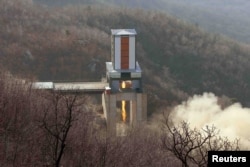U.S. President-elect Donald Trump refuted Kim Jong Un’s implied message that his military may soon test an intercontinental ballistic Missile (ICBM) capable of reaching the U.S. mainland, that the North Korean leader made during his New Year’s Day address.
On Monday Trump sent out a Tweet saying, “It won’t happen!”
The president-elect also repeated on Twitter criticisms he made in the past against China for failing to stop its economically dependent ally in Pyongyang from developing its nuclear weapon and ballistic missile programs.
South Korea praised Trump’s tweets for exhibiting a “clear understanding about the graveness and urgency of North Korea's nuclear threat.”
“It can be read as a clear warning against Kim Jong Un's ICBM comments in his New Year's address hinting about the possibility of provocation,” said South Korean Foreign Ministry Spokesman Cho June-hyuck.
Mobile missiles
However preventing North Korea from testing an ICBM is easier said than done.
“If future President Trump (or) when he’s president then President Trump blows up the space launch center at Sohae, unless all the missiles happen to be there, that really doesn’t solve your problem,” said Jeffrey Lewis, the director of the East Asia Nonproliferation Program at the Middlebury Institute of International Studies in California.
Until recently American defense analysts maintained that North Korea was only capable of reaching the U.S. mainland with a Taepodong-2 missile that has in the past been fired from a fixed site at the Sohae Satellite Launching Station.
In 2016 and 2012 North Korea launched Taepodongs as rockets that Pyongyang claims were part of a peaceful space program to deliver Earth observation satellites into orbit. However, the North’s space program has been widely denounced as a pretense to advance nuclear and ballistic missiles technologies that are banned by United Nations resolutions.
But in the last year, in addition to conducting two increasingly powerful nuclear tests and numerous missile tests from road mobile and submarine launch platforms, North Korea tested a new more powerful engine for two mobile ICBMs, the KN08 and the KN14, that could increase their range enough to reach anywhere in the U.S.
“When we looked at the nozzles on the back of the missiles, they look like a much more sophisticated engine,” said Lewis.
North Korea’s long-range mobile missile launchers can be kept hidden underground or in shelters at different locations throughout the country, making them difficult for the U.S. military to target in advance of a test launch.
Negotiation gambit
It should be noted that the North Korean leader did not overtly threaten to test fire an ICBM during his address to the nation on the first day of the New Year. Instead Kim was recapping his country’s nuclear advancements in the last year that included the testing of the ICBM engine.
The next logical phase, analysts say, would be a test launch of this new capability.
Kim also said his country will continue to build up its nuclear capabilities as long as the United States and its allies threaten the North’s security and specifically objected to the American/South Korean joint military exercises conducted every year.
Analyst Yang Moo-jin, with the University of North Korean Studies in Seoul says Kim New Year’s message was an attempt to project strength in advance of possible negotiations with the Trump administration.
"We can see North Korea's attitude to approach carefully, and it’s strategic intention to control the response level according to the policy towards North Korea, which will be established by Trump administration," said Yang.
However, North Korean defector and analyst Ahn Chan-il, with the World Institute for North Korean Studies, says if Kim wanted to pressure Trump to negotiate with the threat of an ICBM launch, his gambit may have failed.
“It is worrisome that Kim Jong Un mentioned the ICBM that may accelerate or stimulate his opponents in the U.S.,” said Ahn.
During the presidential campaign Trump called North Korean leader Kim Jong Un a “maniac” but gave the young leader credit for ruthlessly seizing power. At the same time he emphasized that the U.S. must be tough in dealing with any provocations, saying, “This guy doesn’t play games. And we can’t play games with him.”
Youmi Kim and Kim Hwan-yong in Seoul contributed to this report.





